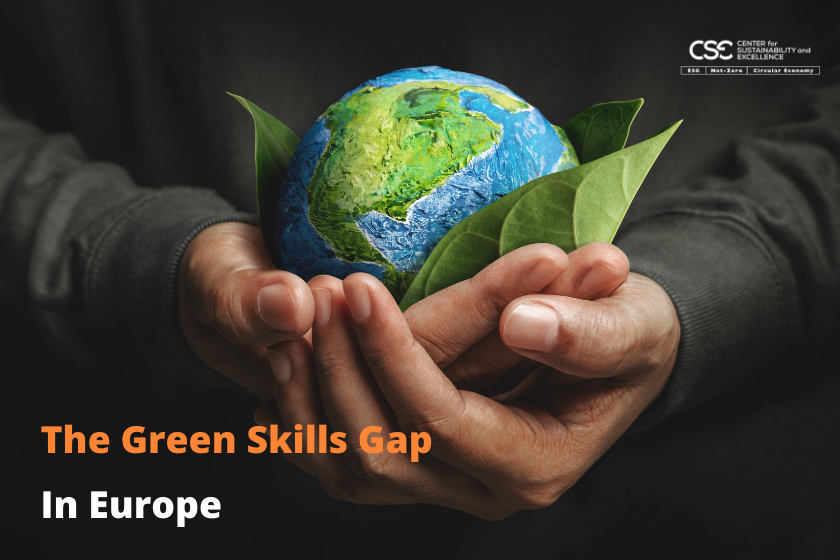L'Europe est confrontée à un défi de taille pour combler le déficit de compétences vertes alors qu'elle s'efforce d'atteindre les objectifs climatiques ambitieux énoncés dans l'Accord de Paris. L'accélération rapide des opportunités d'emplois verts, en particulier dans des secteurs tels que les énergies renouvelables, la construction durable et l'industrie manufacturière, souligne l'urgence de remédier à cette pénurie. Toutefois, la demande de compétences vertes a dépassé l'offre, ce qui a des conséquences sur la capacité de la région à passer à une économie durable.
La croissance de la demande de compétences vertes
Le Global Green Skills Report 2024 révèle que les offres d'emploi dans le domaine de l'écologie ont considérablement augmenté en Europe. Des pays comme le Royaume-Uni et l'Irlande ont connu une hausse notable des besoins en compétences vertes, sous l'effet de politiques climatiques strictes et d'investissements dans les énergies renouvelables et les infrastructures durables. Le Royaume-Uni, par exemple, est en tête de la demande d'emplois verts, avec 13% des offres d'emploi nécessitant au moins une compétence verte. Cette situation reflète l'engagement du pays à décarboniser son économie grâce à des initiatives législatives telles que le Loi sur le changement climatique.
Le défi du déficit de compétences
Malgré une demande croissante de compétences vertes, l'offre reste limitée. Entre 2023 et 2024, l'offre de talents verts en Europe n'a augmenté que de 5,6%, contre une hausse de la demande de 11,6%. Cette disparité devrait s'aggraver, avec un écart de 101,5% prévu d'ici 2050, à moins d'interventions immédiates. Les secteurs de la construction et de l'industrie manufacturière, qui jouent un rôle essentiel dans la réalisation des objectifs de consommation nette zéro, sont particulièrement touchés. Dans le secteur de la construction, où les compétences écologiques sont essentielles pour la modernisation et la conception durable, seuls 26% de la main-d'œuvre possèdent ces compétences.
Principaux facteurs contribuant à l'écart
- Accès limité à la formation : De nombreux travailleurs, en particulier des jeunes générations, font état d'un manque d'accès aux programmes de formation aux compétences vertes. Moins de la moitié des travailleurs de la génération Z en Europe ont accès à ce type de formation, la disponibilité tombant à 25% dans certaines régions comme les États-Unis, un cas comparable.
- Disparité entre les sexes : Les femmes restent sous-représentées dans la main-d'œuvre verte, ne constituant que 10% de talents verts contre 17% pour les hommes. Cette disparité ralentit les progrès vers une économie verte plus inclusive.
- Manque de sensibilisation : De nombreux demandeurs d'emploi potentiels ne sont pas conscients de la diversité des emplois verts disponibles, tels que les emplois dans le domaine des énergies renouvelables, de l'établissement de rapports sur le développement durable et de la fabrication à faible émission de carbone.
Réponses de la politique et de l'industrie
Les gouvernements et les entreprises européens déploient des efforts concertés pour combler ce fossé. Des initiatives telles que les programmes de perfectionnement dans le secteur des énergies renouvelables en Allemagne et les incitations fiscales pour la construction durable en France favorisent l'acquisition de compétences vertes. En outre, des pays comme le Portugal ont démontré l'efficacité de l'alignement des politiques sur les investissements, en réalisant une augmentation de 71,3% de la demande d'emplois verts entre 2023 et 2024.
Recommandations pour combler le fossé
- Développer l'éducation verte : Les gouvernements doivent intégrer les compétences vertes dans les programmes d'enseignement et soutenir les partenariats avec les industries pour offrir une formation pratique.
- Encourager le développement de la main-d'œuvre : Les politiques qui financent des initiatives de requalification, en particulier pour les groupes sous-représentés tels que les femmes, peuvent élargir la réserve de talents.
- Renforcer les campagnes de sensibilisation : Les initiatives de sensibilisation du public peuvent mettre en évidence l'éventail des carrières vertes disponibles et les voies permettant d'acquérir les compétences nécessaires.
- Tirer parti de la technologie : Des plateformes numériques telles que LinkedIn ont démontré leur capacité à cartographier les tendances en matière de compétences vertes et à fournir des ressources de formation ciblées.
Conclusion
Combler le déficit de compétences vertes n'est pas seulement un impératif environnemental, c'est aussi une opportunité économique. Avec les bonnes politiques et les efforts de collaboration entre les gouvernements, les entreprises et les établissements d'enseignement, l'Europe peut exploiter son potentiel d'emplois verts, en garantissant une main-d'œuvre qualifiée pour faire avancer son programme de développement durable. Les enjeux sont importants et il est temps d'agir.
Ne manquez pas l'occasion de participer à notre prochaine conférence de presse. Programme de praticiens certifiés en développement durable (ESG) Europe - Asie, édition avancée 2025Les 22, 23 et 26 mai, la Commission européenne organisera une conférence sur le développement durable afin de garantir la conformité, d'améliorer les pratiques en matière de développement durable et de saisir les opportunités offertes par l'évolution du paysage réglementaire.







